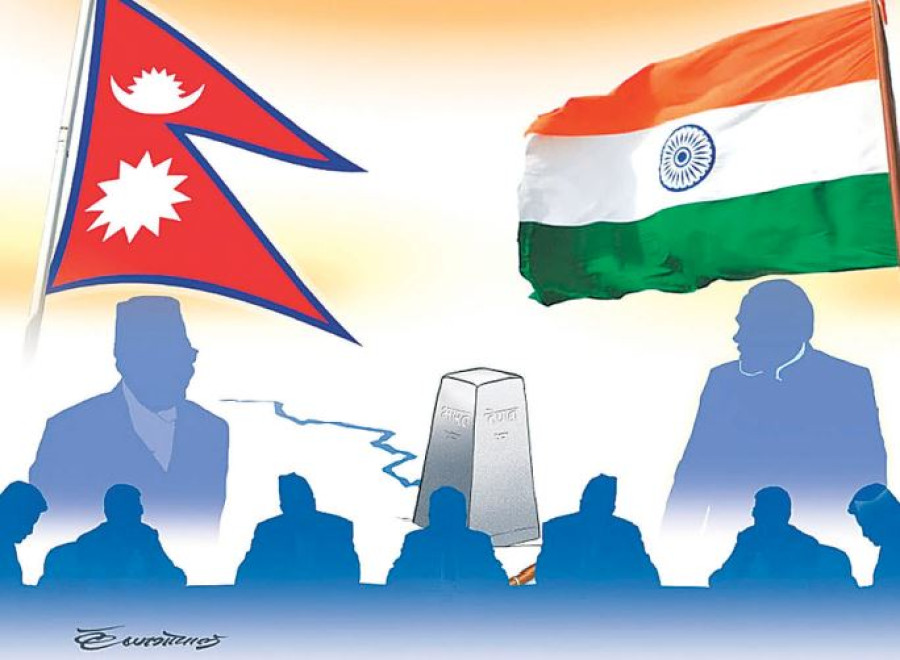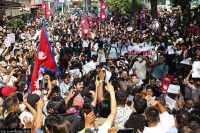National
Government is pursuing alternative channels to end impasse with Delhi
No progress in plans for talks over boundary dispute despite keenness from both the countries, and leaders say ongoing standoff within the ruling party is not helping.
Anil Giri
Amid the continuing diplomatic standoff between Nepal and India over the ongoing boundary dispute, the government is seeking suggestions on how to get India to sit down for talks.
In the past few weeks, Foreign Minister Pradeep Gyawali has held a series of meetings with former ministers, diplomats and experts seeking their advice, multiple officials told the Post in separate interviews.
Gyawali confirmed to the Post that efforts are being made to hold talks with India.
“Exercises are going on in Kathmandu and New Delhi to open the channels of communication with India, but it will take some time before there are results,” said Gyawali.
But nothing concrete has been decided on the way forward in initiating talks with India.
India has been reluctant to talk since Nepal published a new map depicting Limpiyadhura, Lipulekh and Kalapani as parts of the Nepal territory. India claims these areas as its own.
Though both Kathmandu and Delhi have said they are keen to resolve the issue through talks, both have failed to create an environment for dialogue.
The Oli administration's move to get the federal parliament to endorse the new map has further complicated the matter, insiders in the government say, as that has shrunk the space for dialogue.
Nepal’s move came after India’s Defence Minister Rajnath Singh virtually inaugurated a road on May 8 to China through Lipulekh. India claims it has sovereignty over the area. In November last year, it published a map showing it as part of India.
Soon after the border dispute with India heated up, Prime Minister KP Sharma Oli intended to send former prime minister and senior leader of his Nepal Communist Party (NCP), Madhav Kumar Nepal, to India to discuss the issue. The plan did not materialise.
Gyawali, who has been meeting former foreign ministers for the past few weeks, on Friday met former diplomats, ambassadors and experts to solicit their views on how to break the deadlock with India.
“Though Foreign Minister Gyawali claimed that the government is in contact with the Indian political leadership, there are no results yet,” Deep Kumar Upadhyay, a former ambassador to India, told the Post.
Former foreign secretary Gyan Chandra Acharya, head of the international relations department at Tribhuvan University Prof Khadka KC, and Chairman of the National Defense University Lieutenant General Balananda Sharma were among those invited for the consultation on Friday, according to the Ministry of Foreign Affairs.
Gyawali, Rajan Bhattarai, foreign relations adviser to the prime minister, foreign secretary Shankar Das Bairagi and Joint-secretary Ram Prasad Subedi were also present.
“Why can’t Foreign Minister Gyawali ring up his counterpart S Jaishankar directly, instead of running from pillar to post in Kathmandu to make talks happen,” said a Nepali diplomat who did not want to be identified. “Personal bonds and relations with politicians of both neighbours are very important in such times.”
Prime Minister Oli too has been making his own efforts to open up backdoor communication.
Oli and his advisers earlier had reached out to some of the Indian ruling party leaders including BJP National General Secretary Ram Madhav, BJP’s New Delhi leader Vijay Jolly and some religious leaders belonging to the Rashtriya Swayamsevak Sangh, according to at least two leaders of the ruling communist party who did not want to be named.
After repeated attempts made by Oli and his aides failed and could not open a line of communications with New Delhi’s establishment, the government is now exploring other alternatives so that talks with India can be held early, according to multiple officials and politicians familiar with the development.
A ruling party leader told the Post that the Oli government has roped in various sections including the security establishment like the Nepal Army to use a backdoor route to help resolve the boundary dispute.
“But there has been no development since last November,” said the leader who also spoke on condition of anonymity.
Another ruling party leader who is familiar with the efforts to hold talks with India said that New Delhi is closely following the dispute inside the ruling party, its turn of events and how and when it will be settled.
“India knows that if it agrees to hold talks, it will give Oli the upper hand, which another faction of the Nepal Commuist Party may not want,” the leader told the Post. “The internal power struggle and dynamics inside the ruling party are also responsible for the delay in talks.”
The discord inside the ruling party between two rival factions led by Prime Minister Oli and another chairman, Pushpa Kamal Dahal, has dragged on for months and taken a toll on the functioning of the government and the party. But many say it is also having a profound impact on Nepals’ foreign policy.
Ramesh Nath Pandey, a former foreign minister, said he wondered whether the present regime has direct contact with New Delhi.
“I even asked him whether the present regime has direct political contacts with New Delhi,” Pandey, who also was part of Friday’s consultation, told the Post. “If a direct political communication or personal relationship between political leaders cannot be established, then it would be difficult to break the deadlock.”
With the instability in the governing party, India may not want to sit for talks, according to Pandey.
Foreign Minister Gyawali, who is a key leader in the ruling party, agrees that the internal dispute too is somehow responsible for delaying talks with India.
“If not for the dispute, there would have been some progress much earlier,” Gywali told the Post.




 21.12°C Kathmandu
21.12°C Kathmandu















